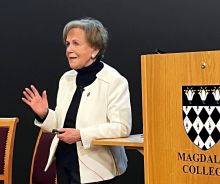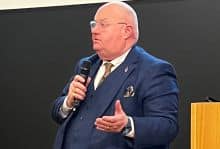Holocaust remembered in Oxford: Ordinary People, Extraordinary Stories
Friday 27th Jan 2023, 12.03pm
 Mrs Tribich had been a child captive and is one of the shrinking number of witnesses and survivors of the atrocities committed during Holocaust. Speaking at Magdalen College alongside Lord (Eric) Pickles, the UK’s special envoy for post-Holocaust issues, Mrs Tribich told in shocking, matter-of-fact terms how she went from happy schoolgirl in western Poland, surrounded by family, to a fearful, persecuted slave labourer and then death camp captive – all before she was 14.
Mrs Tribich had been a child captive and is one of the shrinking number of witnesses and survivors of the atrocities committed during Holocaust. Speaking at Magdalen College alongside Lord (Eric) Pickles, the UK’s special envoy for post-Holocaust issues, Mrs Tribich told in shocking, matter-of-fact terms how she went from happy schoolgirl in western Poland, surrounded by family, to a fearful, persecuted slave labourer and then death camp captive – all before she was 14.
Mala Tribich told in shocking, matter-of-fact terms how she went from happy schoolgirl in western Poland, surrounded by family, to a fearful, persecuted slave labourer and then death camp captive – all before she was 14
Despite her now advanced years, Mrs Tribich has given many talks about her terrible experiences, and last night in Oxford she emphasised the critical place of education in conquering hate.
‘It is very important people learn about it,’ she said. ‘So, it doesn’t happen again. It is important for young people to see what happens when civilization breaks down. We need to educate our children not to hate, not be prejudiced…I hope it will happen, but not in my lifetime.’
 Lord Pickles, the former Bradford MP, who has been involved with anti-racism for many years and was a founder of the Holocaust Education Trust, stressed ‘we are now on the cusp’ of the exceptional events of the Holocaust passing out of living memory. He maintained, ‘The difficulty now is that there is a whole industry out there which wants to claim the Holocaust did not happen. There is denial and distortion…we are also living in an age of deep fakes.’
Lord Pickles, the former Bradford MP, who has been involved with anti-racism for many years and was a founder of the Holocaust Education Trust, stressed ‘we are now on the cusp’ of the exceptional events of the Holocaust passing out of living memory. He maintained, ‘The difficulty now is that there is a whole industry out there which wants to claim the Holocaust did not happen. There is denial and distortion…we are also living in an age of deep fakes.’
It is important for young people to see what happens when civilization breaks down. We need to educate our children not to hate, not be prejudiced
Mala Tribich
Hosted by Magdalen’s president Dinah Rose KC, and organised by Magdalen History DPhil researcher, Barnabas Balint, last night’s talk was part of a series of eight events happening around Oxford, under this year’s Holocaust memorial theme: Ordinary People, Extraordinary Stories.
Despite her terrible experiences, Mrs Tribich described herself as ‘lucky’ on several occasions, pointing out chance events which led her to survive, while her parents, sister, aunts and uncles were murdered. She explained she had a very ordinary childhood, until the outbreak of war, when her world was turned upside down.
Initially, to avoid being deported, she was sent to live with a Christian family near the German border, who were paid to look after her. The fear and terror of those years, were palpable, as she said plainly, ‘There were rewards for turning in Jews…some people made a good living out of it.’
The difficulty now is that there is a whole industry out there which wants to claim the Holocaust did not happen. There is denial and distortion
Lord Pickles
Mrs Tribich spoke with clarity of her years a slave labourer and concentration camp captive, caring for her young cousin, while a child herself. She mentioned by name, friends and relations who had perished and, in a most powerful explanation, Mrs Tribich said she always mentioned the people by name, who had died in the Holocaust, so they were not forgotten – not eradicated from history, as the Nazis had wanted.
Lord Pickles told the audience, ‘This happened not so long ago and not so far away and the truth is, most people who committed atrocities just walked away….[We] went to the moon on a rocket designed by a Nazi who had worked slave labourers to death. This year’s theme is Ordinary People, and it is not just the victims who were ordinary but the perpetrators as well.’
Mrs Tribich said she always mentioned the people by name, who had died in the Holocaust, so they were not forgotten – not eradicated from history, as the Nazis had wanted
While revealing a Holocaust memorial has been given government support to be built alongside Westminster, Lord Pickles said, ‘The Nazis would not have been able to murder six million Jews without collaboration…the Holocaust did not happen in a dark corner but in clear visibility.’
Lord Pickles said antisemitism ‘diminishes us all’.
Magdalen College’s famous tower is set to turn purple this evening [27 Jan] – one of some 200 buildings to be flood-lit as part of the national campaign to ‘light the darkness’ – in commemoration of Holocaust Memorial Day at Oxford.
Also helping in the auditorium last night was Martha Kashti, a postgraduate student.

